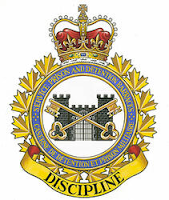CFDBSP stands empty of prisoners most of the time – except for the 28 staff members who are retained "just in case" a military member or two are sentenced to incarceration.
In general, the very few who are “imprisoned” do not return to military service. If their sentences extend beyond “two years less a day” they will complete their sentences at a federal penitentiary. After completion of their sentences, they can be released, dismissed or dismissed with disgrace.
If all 25 cells of the CFDBSP were occupied the cost to the Canadian taxpayer would be $100,000 per prisoner.
It is time that military personnel sentenced to imprisonment are removed from the Canadian military on conviction and sent directly to a federal facility. The number of Military Police members be reduced by 28, the same number who are so obscenely underemployed, saving the beleaguered Canadian taxpayer $2.2 million per year.
Links
▼
Thursday, November 16, 2023
Club Ed
Global Military Justice Reform Contributor Tim Dunne writes here about an expensive, pretty-much-empty Canadian military confinement facility. Excerpt:

1. The name of the facility is the Canadian Forces Service Prison and Detention Barracks.
ReplyDelete2. Detention is still very much a punishment under the Code of Service Discipline. While it cannot be imposed for service infractions tried by summary hearing, it can be imposed as a sentence at court martial. And it has been imposed by courts martial recently.
3. Dismissal and Dismissal with Disgrace can be imposed as sentences and will automatically lead to a compulsory release under Item 1(a) on the Table to art 15.01 of the QR&O. However, if it is not imposed as a sentence at court martial, Dismissal is not an 'administrative option'. And, while release under a different 'Item' may well arise and be justified if a CF member is convicted of one or more service offences, that is a separate decision that is not made under the Code of Service Discipline.
4. While the CFSPDB certainly should be the subject of regular review to ensure that costs are minimized, and that it operates efficiently and effectively, the maintenance of a system of military justice will have expenses associated with that. Similarly, courts martial are not inexpensive. But that is part of the cost of maintaining a system that is fair. And effective review starts with getting the underlying principles and facts correct.
I have a huge respect for Rory Fowler’s contemplations about military justice and I am mindful that he is one of the best minds that has come out of Canada’s Judge Advocate General branch. I, on the other hand, am an ageing student of history and philosophy, and my opinion runs counter to Mr. Fowler’s.
ReplyDeleteHe believes that “CFSPDB certainly should be the subject of regular review to ensure that costs are minimized, and that it operates efficiently and effectively, the maintenance of a system of military justice will have expenses associated with that.”
However, I believe that the Canadian Forces Service Prison and Detention Barracks, which is normally unoccupied, should be closed and converted into a homeless shelter and the 28 staff, as they are apparently unneeded, could be retired and the $2.2 million dollars and the costs of operation and maintenance of the facility could be used to defray the $1 billion which the Canadian government wishes to claw back from the defence budget.
It is time for federal government decision-makers to take a long, hard look at the Canadian military justice system to determine if it is relevant in 21st century Canada. This system comprises four distinct components: the Military Police, the Military Prosecution Service, Defence Counsel Service, and military judges.
Historically, Military Police have handled security patrols, custody of prisoners of war, managing stragglers, and vehicular traffic control to provide clear access to the battle area. During the Second World War, investigations and their follow-on requirements were the domain of members of the Royal Canadian Mounted Police who “transferred” to the Military Police during the war but returned to their police responsibilities following “VE Day.”
Canada is not at war. If our experience in Afghanistan is an indicator, we can transport a suspect from the theatre of operations to Canada for trial within a day or two, as so clearly demonstrated in the case of Captain Robert Semrau.
So, do we need to retain a system that is intended for use in the theatre of operations created when it took weeks to transport an accused back to Canadian soil?
I submit that in the 21st century, there should be one system of justice for all Canadians. The only exceptions should be for bona fide need, and there no longer seems to be a need for traditional military justice.